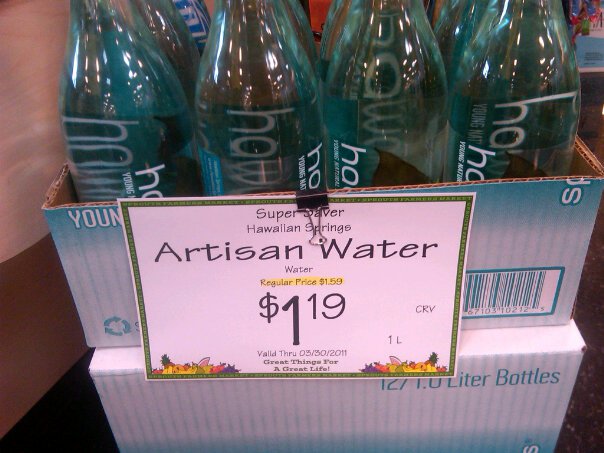
For a long time, I've been trying to think of a good name to call my own style of eating. I eat pretty close to what many consider the Paleo Diet, but I find that term to be a turn off to many. I cringe so much when I say it, that I no longer say it to the newbie. Even many paleo diet proponents suggest that the way to get more people to follow it is to rename it. I agree, but what name?
Listening to a podcast the other day, the term "Real Food Diet" was presented. Despite the accuracy and emotional feelings that a follower of said diet must feel, it's really an insult to someone sitting across the table to proclaim your diet to be "real," as it implies that theirs is not.
"Whole Food Diet" could mean anything, because aren't oatmeal, honey, wheat, and quinoa whole foods? A baguette is merely wheat, yeast, water, and salt. That's a whole food to many people. Make the wheat whole grain wheat and it's now "whole" to another group of people. Using sea salt and making the water artisan helps to bring in a whole new group of whole food aficionados.
 |
| "Artisan" water. ;) |
I can't just tell someone I eat like your ancestors, because I don't. I might eat the ingredient types that they ate, but for them it was the time, place, culture, work habits, spending money, and more that drove food choices and opportunities.
In the end, my own diet is focused on meat and vegetables, with as few "extras" as possible. We don't need those things, and just because they exist doesn't mean we should to eat them. As your mother probably told you, life isn't fair.
I do eat some grains here and there, but grains tend to stand in the way of being able to eat more vegetables and meat, which are more satisfying and closer to required eating.
"If you want to think of the opposite of a bare food, it's a fun food," Galya added.
Fun foods seem to provide those feelings of happiness and nostalgia that tend to make us want to eat more and more of them. Chocolate, cake, ice cream, and other sweets provide little nutritional benefit compared to their bare counterparts or some of their basic ingredients.
Even a fun food made up of bare ingredients can be problematic, since it propels us toward eating for fun, rather than for nutrition. I love these foods, but they need to be a rare spot in my diet, or I'll overeat them.
So, what's a good term?
I posed this question to Galya, and she almost instantly suggested the word "bare" to me.
"Take a food and distill it down to it's bare elements. That's the part of the food you really need."
"Take your diet and focus on those foods that are the bare elements or provide the greatest nutritional benefit."
I posed this question to Galya, and she almost instantly suggested the word "bare" to me.
"Take a food and distill it down to it's bare elements. That's the part of the food you really need."
"Take your diet and focus on those foods that are the bare elements or provide the greatest nutritional benefit."
In the end, my own diet is focused on meat and vegetables, with as few "extras" as possible. We don't need those things, and just because they exist doesn't mean we should to eat them. As your mother probably told you, life isn't fair.
I do eat some grains here and there, but grains tend to stand in the way of being able to eat more vegetables and meat, which are more satisfying and closer to required eating.
"If you want to think of the opposite of a bare food, it's a fun food," Galya added.
Fun foods seem to provide those feelings of happiness and nostalgia that tend to make us want to eat more and more of them. Chocolate, cake, ice cream, and other sweets provide little nutritional benefit compared to their bare counterparts or some of their basic ingredients.
Even a fun food made up of bare ingredients can be problematic, since it propels us toward eating for fun, rather than for nutrition. I love these foods, but they need to be a rare spot in my diet, or I'll overeat them.
Meat and veggies are the bare necessities, followed closely by fruits, nuts, potatoes and squash. Grains and sugars are treats to me, and I save them special occasions. They must be delicious and rare, or I'll just have more meat.
Does the word "bare" give my friend across the table enough to go on? No, but I hope it give him something to think about. The days are numbered for the term "paleo," one way or another. What will take it's place?
No comments:
Post a Comment